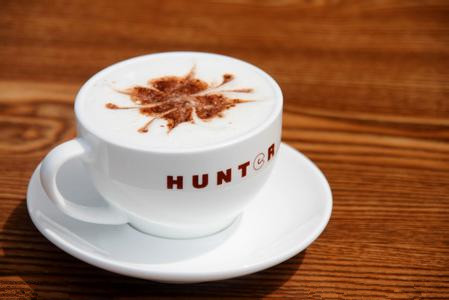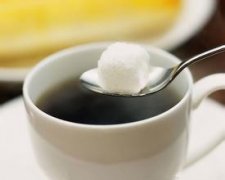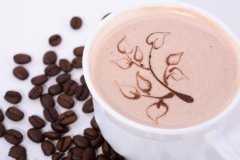The coffee cup is filled with romantic dream coffee common sense.

The coffee pot boils ups and downs, the coffee cup contains dreams, and the misty fragrance in the cafe is enough to accommodate the vicissitudes of the world, which is a harbor for the soul to dock. For most Chinese, coffee is a fashion label. It's not just a drink, it's a lifestyle. If you have a strong coffee complex, then meet up with friends-romantic cafes.
"I wasn't at home, I was at the cafe; I wasn't at the cafe, I was on my way to the cafe." This classic portrayal of coffee culture is a little exaggerated to describe the French coffee complex. And this popular sentence spread to China,"coffee shop" was replaced by "Starbucks", posing an American pose.
A cafe is a city living room. The only big country in the world that doesn't drink coffee is China. Because in the eyes of the Chinese, tea is authentic, while coffee is only imported. Tea is a metaphor for life, coffee is a dream. Coffee can be drunk in a few minutes or neck, while Chinese tea can be continuously brewed and drunk for several hours, so coffee seems to have a more Western aristocratic quality in terms of the way the drink itself is consumed.
In the 1970s, coffee remained in the "noble" stage in China. The coffee shops of some big hotels are mainly prepared for foreign guests staying in the hotel. In the 1980s, people began to recognize "Mai's" and "Nestle" instant coffee, such as "drop fragrant, unfinished","taste very good" advertising words, coffee left the overall impression on the Chinese people. In the late 1990s, when Starbucks was introduced into China, the Chinese people's complex of drinking coffee was on the rise. For most Chinese, coffee represents a mood, a fashion label. It's not just a drink, it's a lifestyle. Drinking coffee is not so much to taste it as to taste a culture, a mysterious and ambiguous feeling.
From the China Market Database? CMDB survey data also showed a significant positive correlation between education levels, monthly household income, and coffee consumption frequency: Only 8.1% of urban residents drink instant coffee at primary school level, 27.7% at junior middle school level, 24.2% at senior middle school level, 27.8% at technical secondary school level and 32.5% at junior college level. However, the proportion of coffee drinkers at university level and above rises to the highest point, reaching 35.8%. The proportion of heavy, moderate or light consumers increases with education level. Only 7.9% of residents with monthly household income below 1999 yuan have the habit of drinking coffee, but 42.5% of consumers drink coffee in households with monthly income above 8000 yuan.
Once heard that French people drink less coffee because of coffee shortage, the number of people napping in the street immediately increased. Although it is exaggerated, the fact is indeed similar to this: after the outbreak of the Gulf War, the French worried that the war would affect the supply of daily necessities and rushed to the supermarket to buy "scarce materials". Later, they found that they took the most coffee and sugar! This was once a joke. In addition to the spiritual level of fun, but from a physiological point of view, coffee has the effect of refreshing, slimming, and even American researchers on 744 couples found that caffeine has stimulated the central nervous system of the brain, speed up the heartbeat and blood circulation of the effect, men often drink coffee, in fact, can play the role of natural Viagra!
When coffee first arrived in Italy, many conservative clerics called it "Satan's masterpiece," but Pope Clement VIII himself sipped coffee and couldn't help but exclaim,"Let coffee be baptized into God's drink!"
The coffee pot boils ups and downs, the coffee cup is filled with dreams, the coffee table is filled with philosophy of life, and the coffee shop is full of misty fragrance, enough to accommodate the vicissitudes of the world, is a harbor for the soul to dock.
Important Notice :
前街咖啡 FrontStreet Coffee has moved to new addredd:
FrontStreet Coffee Address: 315,Donghua East Road,GuangZhou
Tel:020 38364473
- Prev

The main varieties and characteristics of coffee Blue Mountain Coffee
Blue Mountain Coffee: produced in Jamaica, slightly sour, supple, with sweet, delicate flavor, light taste. Columbia: produced in South America, slightly sour glycol, supple aroma alcohol, slightly to medium acid. Brazilian coffee: produced in South America, neutral, medium bitter, strong aroma, slightly sour, slightly bitter, introverted. Manning: from Indonesia and Sumatra. Bitter and mellow, fragrant and bitter. Mocha: produced in clothing
- Next

The advantages and disadvantages of drinking coffee should be seen clearly.
That appropriate bitterness, with rich, mellow, fascinating smell, this is the charm of coffee. Especially when the weather turns cold, when I have a cup of hot strong coffee, I will naturally have a warm feeling in my heart. Whether you are tired of walking, find a place to sit and rest, or find a good place to chat with friends, or want to find a good way to refresh yourself in the office.
Related
- Beginners will see the "Coffee pull flower" guide!
- What is the difference between ice blog purified milk and ordinary milk coffee?
- Why is the Philippines the largest producer of crops in Liberia?
- For coffee extraction, should the fine powder be retained?
- How does extracted espresso fill pressed powder? How much strength does it take to press the powder?
- How to make jasmine cold extract coffee? Is the jasmine + latte good?
- Will this little toy really make the coffee taste better? How does Lily Drip affect coffee extraction?
- Will the action of slapping the filter cup also affect coffee extraction?
- What's the difference between powder-to-water ratio and powder-to-liquid ratio?
- What is the Ethiopian local species? What does it have to do with Heirloom native species?

